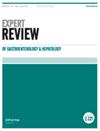Gastroesophageal reflux disease in preterm infants: unmet needs.
IF 3.8
3区 医学
Q2 GASTROENTEROLOGY & HEPATOLOGY
Expert Review of Gastroenterology & Hepatology
Pub Date : 2024-09-18
DOI:10.1080/17474124.2024.2407116
引用次数: 0
Abstract
INTRODUCTION . Many preterm present somatic symptoms including aerodigestive and cardiorespiratory manifestations, in combination with irritability and/or distress, which are often attributed to gastroesophageal reflux (GER), albeit for unclear reasons. AREAS COVERED We searched in PubMed, Google Scholar, and MEDLINE for guidelines, reviews and randomized controlled trials up to March 2024. EXPERT OPINION The diagnosis of GER-disease (GERD) in preterm is challenged because manifestations are atypical and diagnostic investigations difficult and not devoid of risk for adverse events. In case of vomiting or regurgitation, GER as a consequence of anatomical or metabolic conditions should be considered. Although many preterm infants are treated with proton pump inhibitors, this is seldom needed. Low quality evidence for alginates is available, but needs further evaluation. There is a need for an effective and safe prokinetic favoring esophageal clearance, increasing lower esophageal sphincter pressure and stimulating gastric emptying. Non-drug treatment such as feeding adaptations (volume, duration, composition) and positional changes are insufficiently applied. Thickened formula is not indicated in preterm babies. In case none of the above recommendations did result in sufficient improvement, and if documentation of acid GER is not possible, a 2-4 week trial of a proton pump inhibitor is acceptable.早产儿胃食管反流病:尚未满足的需求。
导言。许多早产儿会出现躯体症状,包括呼吸道和心肺症状,同时伴有烦躁和/或窘迫,尽管原因不明,但这些症状通常被归因于胃食管反流(GER)。专家观点早产儿胃食管反流病(GERD)的诊断面临挑战,因为早产儿的胃食管反流病(GERD)表现不典型,诊断检查困难,且存在不良事件风险。如果出现呕吐或反胃,则应考虑胃食管反流是解剖或代谢条件造成的。虽然许多早产儿都接受质子泵抑制剂治疗,但很少需要这样做。藻酸盐的证据质量不高,但需要进一步评估。需要一种有效且安全的促冲洗剂,以利于食道清除、增加食道下括约肌压力并刺激胃排空。非药物治疗,如喂食调整(量、时间、成分)和体位改变,都没有得到充分应用。增稠配方奶粉不适用于早产儿。如果上述建议都没有带来足够的改善,并且无法记录胃酸倒流,则可以试用质子泵抑制剂 2-4 周。
本文章由计算机程序翻译,如有差异,请以英文原文为准。
求助全文
约1分钟内获得全文
求助全文
来源期刊

Expert Review of Gastroenterology & Hepatology
GASTROENTEROLOGY & HEPATOLOGY-
CiteScore
6.80
自引率
2.60%
发文量
86
审稿时长
6-12 weeks
期刊介绍:
The enormous health and economic burden of gastrointestinal disease worldwide warrants a sharp focus on the etiology, epidemiology, prevention, diagnosis, treatment and development of new therapies. By the end of the last century we had seen enormous advances, both in technologies to visualize disease and in curative therapies in areas such as gastric ulcer, with the advent first of the H2-antagonists and then the proton pump inhibitors - clear examples of how advances in medicine can massively benefit the patient. Nevertheless, specialists face ongoing challenges from a wide array of diseases of diverse etiology.
 求助内容:
求助内容: 应助结果提醒方式:
应助结果提醒方式:


